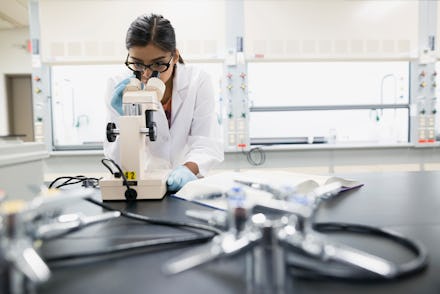Here's What Would Happen If We Treated Male Scientists Like We Do Female Scientists

No matter the level of accomplishment she might achieve, a woman profiled in the media can always expect to field questions about marriage, motherhood and the tired concept of "having it all." And when society celebrates a woman's professional achievements, it often comes with the implication that she either shirked her familial duties or achieved success in spite of them.
In November, the New York Times tweeted about Adele, "A 27-year-old mother who barely uses social media is selling more albums than anyone thought was still possible." Daily Beast senior editor Marlow Stern quipped back, "Imagine Justin Timberlake being described as a '34-year-old dad who barely uses social media.'"
And it's not just the women of Hollywood who are pigeonholed in this manner. Twitter user @Daurmith posted a string of clever tweets Saturday that illustrate just how the language used when describing a successful woman diverges from that of a successful man, composing bios about renowned male scientists the way they might be characterized as females.
In March 2013, science writer Christie Aschwanden published a piece on DoubleX Science explaining what she calls the Finkbeiner Test. (Think of it as science's Bechdel Test, which evaluates how women characters are portrayed in film.)
Aschwanden came up with the idea when her colleague Ann Finkbeiner took a radical approach to an article she was asked to write on a female astronomer. Finkbeiner decided she wouldn't identify the astronomer's gender; instead, saying in a post, "I'm going to pretend she's just an astronomer." Taking her cue from Finkbeiner, Aschwanden developed a set of criteria for biographies on women scientists.
In order to pass the Finkbeiner Test, an article or bio on a female scientist must not mention "the fact that she's a woman, her husband's job, her child care arrangements, how she nurtures her underlings, how she was taken aback by the competitiveness in her field, how she's such a role model for other women" or "how she's the 'first woman to...'"
But while we wait for that to take, we'll keep enjoying Daurmith's musings on Isaac Newton's "large eyes and frail appearance" and the "sassy and carefree" Richard Feynman.